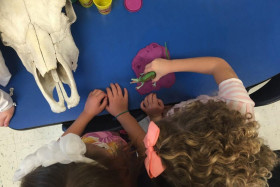Dr. Vanessa Diaz, Developmental Science faculty in the Department of Psychology and co-director of the iLEAP Lab, has been named the College of Science Diversity Fellow. This award comes on the heels of Diaz’s extensive work on her latest research project, Girls Launch!
The goal of Girls Launch is to increase female inclusivity in the sciences, by studying and combating the emergence of gender-based intelligence and science stereotypes in children. When asked about this project, Diaz said, “Girls Launch! is a multifaceted and multiyear outreach and scholarship collaboration with Dr. Carrie Kroehler from the Center for Communicating Science, where I have been a Fellow. Through this partnership, Dr. Kroehler and I recruited volunteer female graduate students in the sciences to present in kindergarten classrooms in Giles County, and thus also provided students with opportunities for developing science communication skills.”
Because in-person presentations were suspended by the COVID-19 pandemic, Kroehler and Diaz and their team were awarded an ICAT Rapid Response Grant to support 10 graduate students in developing video presentations and activity guides of their science, to be shared initially with children in Giles County. Eventually, through a number of partnerships, the videos and activities were made available on the Center for Communicating Science YouTube channel, translated into Spanish and tagged with Virginia Standards of Learning codes, so teachers more easily incorporated them into lesson plans. Some of these lesson plans and videos have now been made available on “Go Open Virginia”, a statewide curriculum and educational resources repository.
In connection to the outreach portion of Girls Launch!, Diaz has collected data that she has since presented at conferences and published in a research article (Diaz, Runyon, & Kroehler, 2020). Excitingly, Diaz participated in a Science-Art collaboration incubator where she partnered with numerous artists at Virginia Tech to interpret children’s responses to her data collection questions in completely innovative ways. Children’s responses and artistic renderings of who can be a scientist were set to poetry by Erika Meitner, music by Charles Nichols, visuals by Zach Duer, interpreted by soprano Ariana Wyatt, accompanied by John Irrera, violin; Ben Wyatt, cello; and Annie Stevens, marimba. The piece, “In the Burrow of Science” (2022) had its world premiere on May 2, 2022, as part of the New Music + Technology Festival by the School of Performing Arts. This partnership was also supported by the Center for Communicating Science.
Diaz’s experience with working in the realm of diversity is multifaceted. When asked about her experience, Diaz said, “I have participated in diverse student and faculty recruitment activities such as “Fall Visitation Weekend”, the “Future Faculty Program” of which I am an alumna, the “Black College Institute”, the “Hispanic College Institute”, and the Multicultural Academic Opportunities Program (MAOP).”
In addition, Diaz has participated and continues to participate in on-going campus efforts such as attending “El Centro” events, the Hispanic/Latinx Caucus on campus, and the COS Undergraduate Research Forum. Diaz also presented at the VT-PREP, IMSD, & Carver Forum, and at the Widening Inclusivity in (Geo)Sciences group. She was also interviewed in popular media about being a Latina in STEM.
So what’s next for Diaz? She has a well thought out plan when it comes to her work with diversity in the community. “In the coming year I look forward to resuming post-pandemic female graduate students visits to Giles county; forging and expanding relations with Floyd county schools; working with the AWARE program from the Women’s Center in supporting middle school girls in Montgomery County; and finding avenues to share “In the Burrow of Science” artistic piece with the larger College of Science community,” said Diaz.
As a Latina woman in the sciences, Diaz feels this work is extremely important. Diaz said, “These elements are central to my teaching and mentoring, providing cutting-edge information to my students, and encouraging them to consider aspects of diversity in their own scientific exploration.” Diaz went on to say, “This work further supports an increase in gender diversity and female inclusivity in the sciences through interventions during childhood.”
When asked about being recognized as an Inclusion and Diversity fellow, Diaz said, “It means the world to receive the recognition that this work is important and have the support to be able to continue!”
